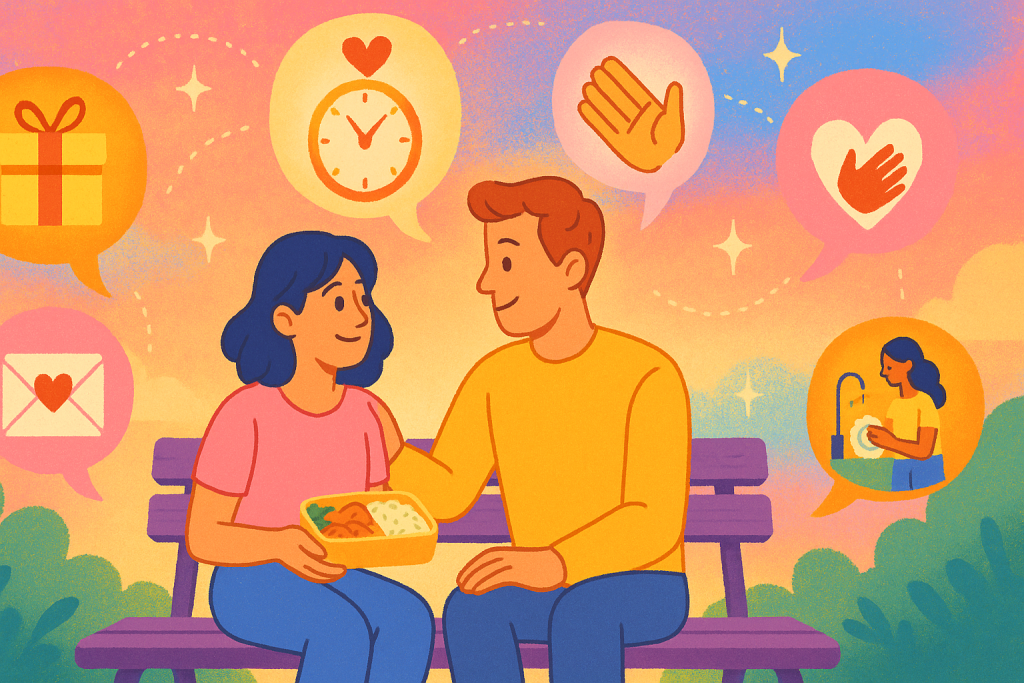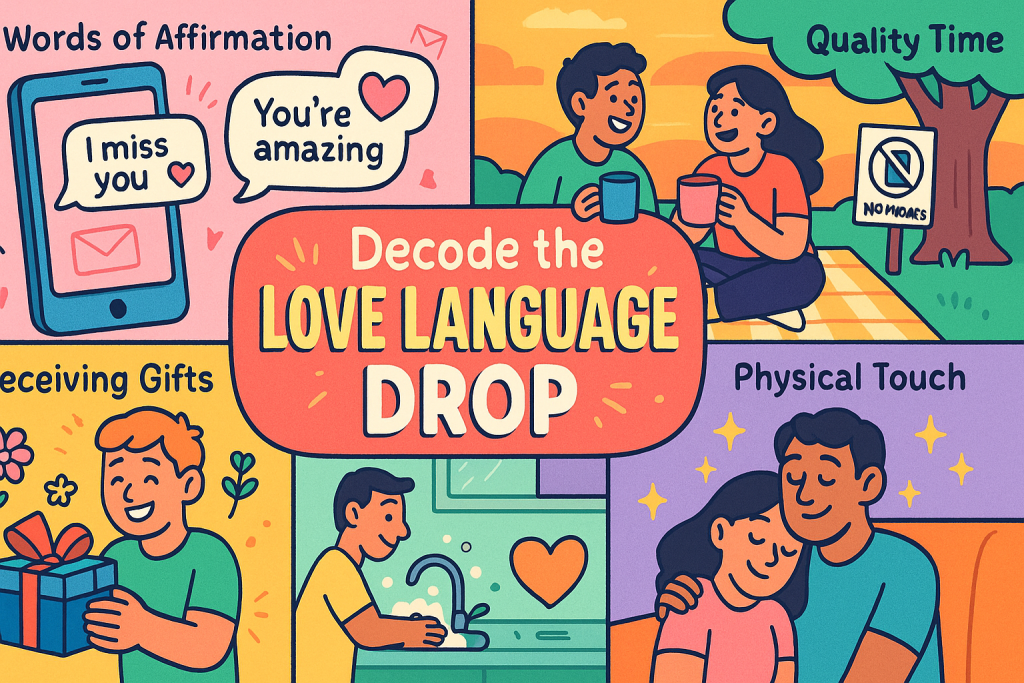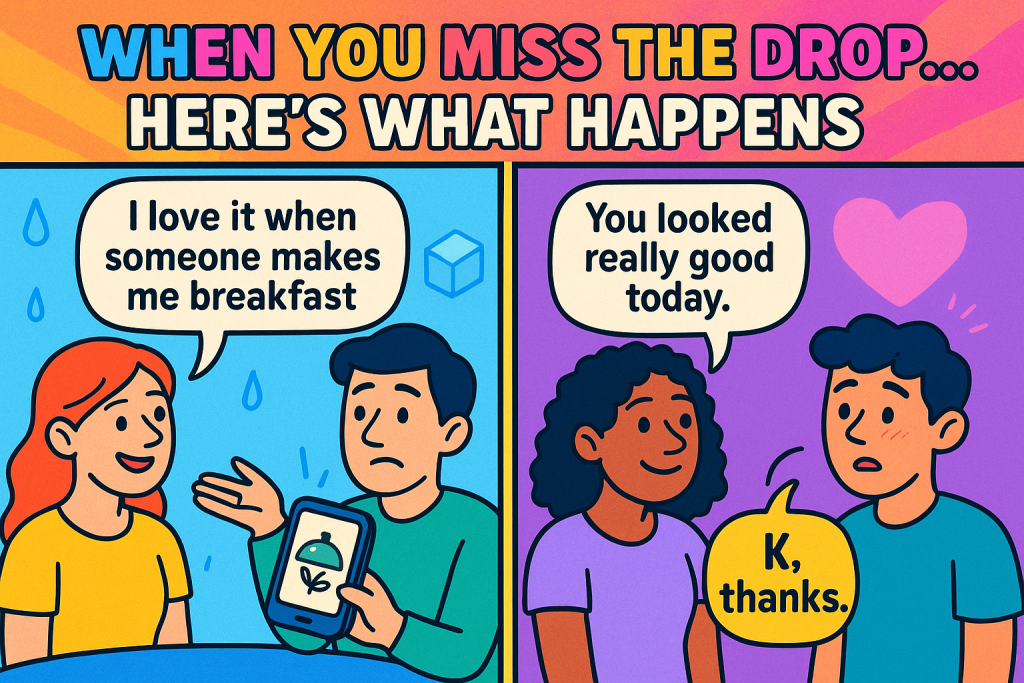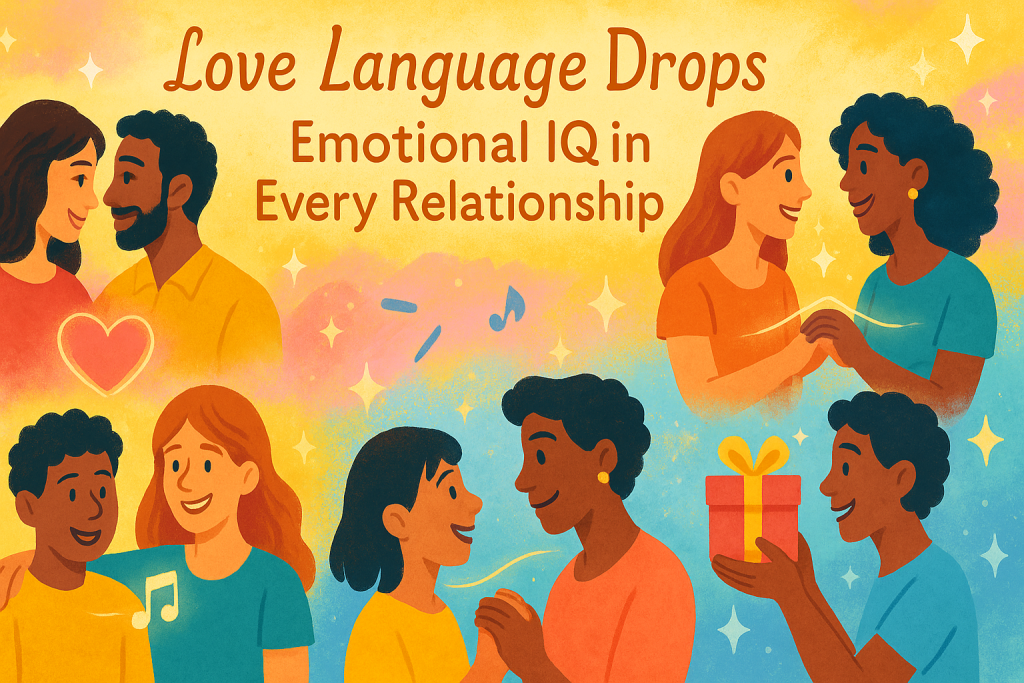Modern love isn’t always about grand gestures or candlelit declarations. Sometimes, it’s about a half-joking comment over dinner or a quiet sigh on a Sunday morning. Enter the Love Language Drop—those subtle clues your partner gives about how they want to be loved. The question is: are you picking up what they’re putting down?

What Is a “Love Language Drop”?
A Love Language Drop is when someone casually reveals—often unintentionally—what makes them feel most loved. It’s not a direct request, but more like a quiet nudge. Think of it as emotional Morse code: if you’re tuned in, you’ll hear it loud and clear. If not? You might miss the moment entirely.
Why drop and not just say it directly? Because humans are complicated:
- They don’t want to seem needy.
- They hope you just “get it.”
- They’re testing the emotional waters.
Understanding these drops is key to building deeper emotional intimacy. It shows you get them—sometimes even better than they get themselves.

The Five Love Languages & What Their Drops Sound Like
We’re borrowing from Dr. Gary Chapman’s famous five love languages—because each one comes with its own style of dropping clues.
1. Words of Affirmation
Love Language Drops:
- “You never tell me you miss me anymore.”
- “I felt so good when you said I looked amazing last weekend.”
How to Catch It:
- Compliment sincerely and often.
- Send unexpected texts just to say “I appreciate you.”
- Don’t underestimate the power of a sweet voice note.
2. Quality Time
Love Language Drops:
- “I love it when it’s just the two of us doing nothing.”
- “Can we have a no-phones night sometime?”
How to Catch It:
- Schedule real, undistracted hangouts.
- Put your phone away and be present.
- Plan small activities you both enjoy—coffee walks, puzzles, sunset watching.
3. Receiving Gifts
Love Language Drops:
- “That keychain you gave me last year? Still my favorite.”
- “I love when someone brings me little surprises, even silly ones.”
How to Catch It:
- Surprise them with small, meaningful items.
- Remember what they mention in passing—they’re probably hinting.
- It’s not about cost, it’s about care.
4. Acts of Service
Love Language Drops:
- “Thanks again for grabbing my groceries. That meant a lot.”
- “It’s so nice when someone notices I’m tired and helps out.”
How to Catch It:
- Look for ways to lighten their load—unasked.
- Cook dinner. Run errands. Offer to help before they ask.
- Actions, not words, are the love letter they’ll remember.
5. Physical Touch
Love Language Drops:
- “That hug earlier? Totally made my day.”
- “I sleep better when you hold me.”
How to Catch It:
- Be physically affectionate, even with small touches.
- Reach for their hand in public.
- Respect their comfort zone, but don’t forget: touch is their emotional charger.

Why People Drop Hints Instead of Saying It Straight
You might wonder: Why not just say what you want? Here’s the deal:
- Some fear sounding demanding or clingy.
- Others come from cultures or families that don’t normalize emotional expression.
- Many are hoping you’ll just know—because if you do, it feels more meaningful.
- And some honestly don’t even realize they’re doing it. It’s subconscious.
So if you miss the drop, it’s not just a missed opportunity—it can feel like rejection.

How to Train Yourself to Catch Love Language Drops
You don’t need psychic powers. You just need to listen differently.
1. Tune Into Emotional Subtext
When someone says something seemingly offhand, ask yourself:
- What are they really saying beneath that sentence?
- Is this a pattern?
2. Track Recurring Themes
If they mention something multiple times—like wanting to spend time together, or how they miss your compliments—that’s a drop. Pay attention.
3. Offer Gentle Experiments
If you think you’ve caught a drop, act on it and see how they react:
- Give a surprise gift.
- Initiate more cuddles.
- Compliment them on purpose.
Positive response? You’re on the right track.
4. It’s Okay to Just Ask
Sometimes, you can ask with warmth and humor:
“I noticed you said you love it when someone helps you out. Is that something that really makes you feel loved?”
Boom—open communication, unlocked.

When You Miss the Drop… Here’s What Happens
Let’s be real. Not catching the drop can be awkward—or even damaging.
Example 1:
Them: “I love it when someone makes me breakfast.”
You: “Yeah, I just use Uber Eats.”
🧊 Result: They feel unseen.
Example 2:
Them: “You looked really good today.”
You: “K, thanks.”
🧊 Result: Missed an opening for meaningful connection.
One small response can make all the difference between intimacy and indifference.

Love Language Drops Aren’t Just Romantic—They’re Emotional IQ
Being able to decode subtle emotional cues is one of the most underrated relationship skills. And it doesn’t just apply to partners:
- Friends
- Siblings
- Parents
Everyone drops hints. The more you catch, the more loved they feel—and the more connected you become.
Pro Tip: Want to Practice? Try Kasual 💬
On platforms like Kasual, where users value emotional connection and real conversation, recognizing these drops can fast-track your bond. You might even drop one yourself in your profile—like:
“My favorite love language? Movie nights without phones and surprise tea deliveries.”
Whoever gets that… might just get you.
Kasual lets you connect with people who speak your language—sometimes literally, but more often emotionally.
👉 Try it now and see who’s dropping hints just for you.
KASUAL
The Anonymous App for Casual Dating
Final Thoughts: The Real “I Love You” Might Be Hidden in a Whisper
Love isn’t always loud. Sometimes it’s a quiet suggestion, a lingering touch, a casual comment that carries more weight than it seems. That’s the magic of the Love Language Drop.
Next time they say, “I really liked when you…”—pause.
They’re telling you how to love them.
Are you ready to catch it?


